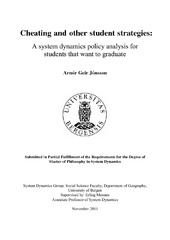| dc.contributor.author | Jonsson, Arnor Geir | eng |
| dc.date.accessioned | 2012-11-01T11:45:54Z | |
| dc.date.available | 2012-11-01T11:45:54Z | |
| dc.date.issued | 2011-11-15 | eng |
| dc.date.submitted | 2011-11-15 | eng |
| dc.identifier.uri | https://hdl.handle.net/1956/6163 | |
| dc.description.abstract | This paper explores different strategies students can utilize in order to graduate. A good grade is considered of great value and something some students are willing to utilize extreme means to achieve. Traditional means of hard work and dedication can help a student to graduate, but for some, alternative measures must also be taken. One possible strategy a student can choose to implement in order to advance his academic carrier is cheating. The system dynamics model constructed for this project is a combination of Carroll's model on school learning (1989), Merton's theory on deviant behavior (1968) and Barlas's and Yasarcan's (2005) SD model on implicit goal structures. The model offers insights on feedback processes available to students and how the students' grade can be affected by cheating. | en_US |
| dc.format.extent | 684688 bytes | eng |
| dc.format.mimetype | application/pdf | eng |
| dc.language.iso | eng | eng |
| dc.publisher | The University of Bergen | eng |
| dc.title | Cheating and other student strategies: A system dynamics policy analysis for students that want to graduate | eng |
| dc.type | Master thesis | en_US |
| dc.rights.holder | Copyright the author. All rights reserved | en_US |
| dc.description.degree | Master of Philosophy in System Dynamics | |
| dc.description.localcode | GEO-SD350 | |
| dc.description.localcode | MASV-SYSDY | |
| dc.subject.nus | 753907 | eng |
| fs.subjectcode | GEO-SD350 | |
